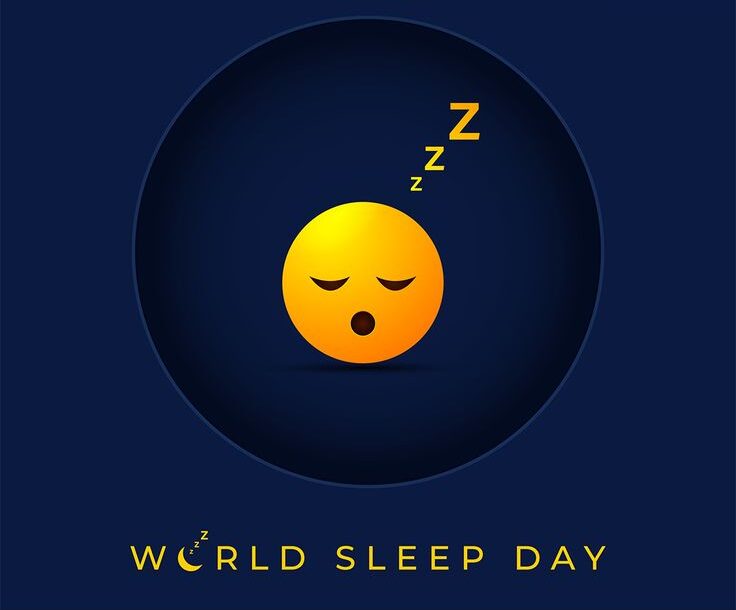World Sleep Day 2025: 7 Powerful Reasons Why Quality Sleep Transforms Your Life
Introduction
World Sleep Day: Imagine waking up every day feeling refreshed, energized, and ready to take on the world—this is the power of good sleep! World Sleep Day, observed annually on the Friday before the Spring Equinox, raises awareness about the importance of sleep for mental, physical, and emotional well-being.
In today’s fast-paced world, sleep deprivation has become a serious health crisis, leading to stress, anxiety, weakened immunity, and chronic illnesses. This day serves as a reminder that healthy sleep is not a luxury—it’s a necessity for a happier and healthier life.
In this article, we explore the history, significance, daily life impact, observance, key facts, and why quality sleep is essential for overall well-being.
History of World Sleep Day
World Sleep Day was founded in 2008 by the World Sleep Society, a global organization dedicated to promoting sleep health and educating people about sleep disorders.
Key Milestones in Sleep Awareness:
- 2008: The first-ever World Sleep Day was celebrated to promote sleep research and awareness.
- 2010: Scientists linked chronic sleep deprivation to heart disease and diabetes.
- 2015: Studies confirmed that poor sleep reduces cognitive abilities and shortens lifespan.
- 2020-Present: The rise of sleep technology, including smart beds, sleep tracking apps, and blue-light filters, helps people improve their sleep quality.
Each year, World Sleep Day follows a specific theme, addressing different aspects of sleep health. Some past themes include:
- 2024: “Sleep Equity for Global Health”
- 2023: “Sleep is Essential for Health”
- 2022: “Quality Sleep, Sound Mind, Happy World”
The goal of this day is to encourage better sleep habits, promote research, and address global sleep-related health issues.
Why World Sleep Day is Important: 7 Powerful Reasons
Getting enough sleep is not just about feeling rested—it directly impacts health, productivity, and emotional well-being. Here are seven compelling reasons why prioritizing sleep is life-changing:
- Boosts Brain Function & Memory – Sleep enhances concentration, problem-solving skills, and long-term memory retention.
- Strengthens Immune System – Quality sleep reduces the risk of infections, colds, and chronic illnesses.
- Reduces Stress & Anxiety – Lack of sleep increases cortisol (stress hormone), leading to mood swings and mental exhaustion.
- Supports Heart Health – Sleeping well lowers blood pressure and reduces the risk of heart disease and strokes.
- Regulates Weight & Metabolism – Poor sleep disrupts hormones that control hunger, leading to weight gain.
- Improves Emotional Well-being – A well-rested mind helps reduce depression and enhances happiness levels.
- Increases Productivity & Performance – Sleep improves focus, creativity, and decision-making abilities in daily life.
Quality sleep is the foundation of a healthier, longer, and more fulfilling life.
Impact of Sleep on Daily Life
How Does Sleep Affect Our Everyday Activities?
Sleep influences how we think, feel, and perform throughout the day:
✅ Better Decision-Making – A well-rested brain makes smarter and more rational choices.
✅ Enhanced Work Performance – Employees who sleep well are more efficient, creative, and less prone to burnout.
✅ Safe Driving & Alertness – Sleep deprivation increases the risk of accidents due to slow reflexes and drowsiness.
✅ Stronger Relationships – Lack of sleep leads to irritability and communication issues, affecting social interactions.
✅ Physical Endurance & Fitness – Athletes who sleep well recover faster and perform better in sports.
Sleep plays a crucial role in every aspect of our lives, from relationships to professional success.
How is World Sleep Day Observed?
On World Sleep Day, medical professionals, sleep experts, and communities come together to promote healthy sleep habits and awareness about sleep disorders:
✔️ Educational Seminars & Workshops – Experts discuss insomnia, sleep apnea, and ways to improve sleep quality.
✔️ Social Media Campaigns – Hashtags like #WorldSleepDay and #BetterSleepBetterLife trend globally.
✔️ Health Check-ups & Sleep Studies – Clinics offer free sleep assessments and consultations.
✔️ Awareness Programs in Schools & Workplaces – Encouraging students and employees to prioritize sleep hygiene.
✔️ Challenges & Initiatives – Sleep-tracking challenges motivate people to improve their sleep duration and habits.
✔️ Meditation & Relaxation Events – Yoga, guided meditation, and mindfulness exercises help people sleep better.
Small changes, like setting a consistent bedtime and limiting screen time before sleep, can make a huge difference!
Interesting Facts About Sleep
📌 Humans spend one-third of their lives sleeping, which equals about 25 years of sleep in a lifetime.
📌 The longest recorded time without sleep is 11 days, achieved by Randy Gardner in 1964.
📌 More than 45% of the world’s population suffers from sleep problems, according to the World Sleep Society.
📌 Lack of sleep for just one night reduces brain function similar to alcohol intoxication.
📌 Your body temperature drops when you sleep, which is why you may feel cold at night.
Frequently Asked Questions (FAQs)
1. Why do we celebrate World Sleep Day?
To raise awareness about the importance of sleep, promote healthy sleep habits, and address sleep disorders globally.
2. What is the theme for World Sleep Day 2025?
The official theme is yet to be announced, but it will likely focus on mental health, lifestyle changes, or sleep equity.
3. How can I improve my sleep quality?
- Maintain a consistent sleep schedule (sleep and wake up at the same time).
- Limit screen time before bed (reduce blue light exposure).
- Avoid caffeine, alcohol, and heavy meals at night.
- Create a relaxing bedtime routine (read, meditate, or listen to calming music).
- Ensure your bedroom is dark, quiet, and comfortable.
4. What are common sleep disorders?
- Insomnia – Difficulty falling or staying asleep.
- Sleep Apnea – Interrupted breathing during sleep.
- Narcolepsy – Excessive daytime sleepiness and sudden sleep attacks.
- Restless Legs Syndrome (RLS) – Uncomfortable sensations in the legs, disrupting sleep.
5. How much sleep do we really need?
- Adults (18-64 years): 7-9 hours
- Teenagers (14-17 years): 8-10 hours
- Children (6-13 years): 9-11 hours
- Elderly (65+ years): 7-8 hours
Wishing Messages for World Sleep Day
💬 “A good laugh and a long sleep are the two best cures for anything—Happy World Sleep Day!”
💬 “May your dreams be sweet, your rest be deep, and your mornings be fresh!”
💬 “Prioritize your sleep today for a healthier and happier tomorrow!”
💬 “Sleep well, live well! Wishing you peaceful nights and energetic days ahead!”
Conclusion: Why Sleep Should Be a Priority in Your Life
Sleep is not just about resting—it’s about healing, recharging, and thriving. World Sleep Day reminds us that good sleep is the key to better health, sharper focus, and a more fulfilling life.
By practicing better sleep habits and raising awareness, we can improve our well-being and prevent sleep-related health issues.
🌙 Sleep Well | Stay Healthy | Live Better 🌙










